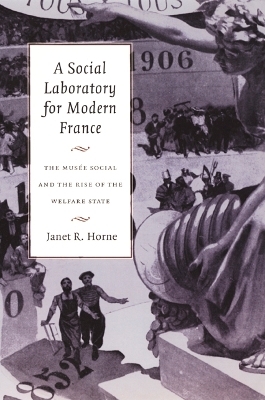
A Social Laboratory for Modern France
The Musée Social and the Rise of the Welfare State
Seiten
2002
Duke University Press (Verlag)
978-0-8223-2782-0 (ISBN)
Duke University Press (Verlag)
978-0-8223-2782-0 (ISBN)
As a nineteenth-century think-tank that sought answers to France's pressing "social question," the Musee Social reached across political lines to forge a reformist alliance founded on an optimistic faith in social science. This book presents the story of this institution.
As a nineteenth-century think tank that sought answers to France’s pressing “social question,” the Musée Social reached across political lines to forge a reformist alliance founded on an optimistic faith in social science. In A Social Laboratory for Modern France Janet R. Horne presents the story of this institution, offering a nuanced explanation of how, despite centuries of deep ideological division, the French came to agree on the basic premises of their welfare state.
Horne explains how Musée founders believed—and convinced others to believe—that the Third Republic would carry out the social mission of the French Revolution and create a new social contract for modern France, one based on the rights of citizenship and that assumed collective responsibility for the victims of social change. Challenging the persistent notion of the Third Republic as the stagnant backwater of European social reform, Horne instead depicts the intellectually sophisticated and progressive political culture of a generation that laid the groundwork for the rise of a hybrid welfare system, characterized by a partnership between private agencies and government. With a focus on the cultural origins of turn-of-the-century thought—including religion, republicanism, liberalism, solidarism, and early sociology—A Social Laboratory for Modern France demonstrates how French reformers grappled with social problems that are still of the utmost relevance today and how they initiated a process that gave the welfare state the task of achieving social cohesion within an industrializing republic.
As a nineteenth-century think tank that sought answers to France’s pressing “social question,” the Musée Social reached across political lines to forge a reformist alliance founded on an optimistic faith in social science. In A Social Laboratory for Modern France Janet R. Horne presents the story of this institution, offering a nuanced explanation of how, despite centuries of deep ideological division, the French came to agree on the basic premises of their welfare state.
Horne explains how Musée founders believed—and convinced others to believe—that the Third Republic would carry out the social mission of the French Revolution and create a new social contract for modern France, one based on the rights of citizenship and that assumed collective responsibility for the victims of social change. Challenging the persistent notion of the Third Republic as the stagnant backwater of European social reform, Horne instead depicts the intellectually sophisticated and progressive political culture of a generation that laid the groundwork for the rise of a hybrid welfare system, characterized by a partnership between private agencies and government. With a focus on the cultural origins of turn-of-the-century thought—including religion, republicanism, liberalism, solidarism, and early sociology—A Social Laboratory for Modern France demonstrates how French reformers grappled with social problems that are still of the utmost relevance today and how they initiated a process that gave the welfare state the task of achieving social cohesion within an industrializing republic.
Janet R. Horne is Associate Professor of French at the University of Virginia.
Acknowledgments
Introduction
Part One. Rhetoric of Reform
1. The Modern Sphinx: Debating the Social Question in Nineteenth-
Century France
2. Inventing a Social Museum
Part Two. Networking for Reform
3. A Genealogy of Republican Reform
4. A Laboratory for Social Reform
Part Three. Implementing Reform
5. Voluntary Associations and the Republican Ideal
6. The Modernity of Hygiene: Interventions in the City
Conclusion
Notes
Bibliography
Index
| Zusatzinfo | 15 b&w photos, 2 tables |
|---|---|
| Verlagsort | North Carolina |
| Sprache | englisch |
| Gewicht | 862 g |
| Themenwelt | Geschichte ► Allgemeine Geschichte ► Neuzeit (bis 1918) |
| Geisteswissenschaften ► Geschichte ► Regional- / Ländergeschichte | |
| Geschichte ► Teilgebiete der Geschichte ► Kulturgeschichte | |
| Geschichte ► Teilgebiete der Geschichte ► Sozialgeschichte | |
| Sozialwissenschaften ► Politik / Verwaltung ► Staat / Verwaltung | |
| Sozialwissenschaften ► Soziologie | |
| ISBN-10 | 0-8223-2782-1 / 0822327821 |
| ISBN-13 | 978-0-8223-2782-0 / 9780822327820 |
| Zustand | Neuware |
| Haben Sie eine Frage zum Produkt? |
Mehr entdecken
aus dem Bereich
aus dem Bereich
Europa 1848/49 und der Kampf für eine neue Welt
Buch | Hardcover (2023)
DVA (Verlag)
48,00 €
Giordano Bruno - ein ketzerisches Leben
Buch | Hardcover (2024)
C.H.Beck (Verlag)
29,90 €


